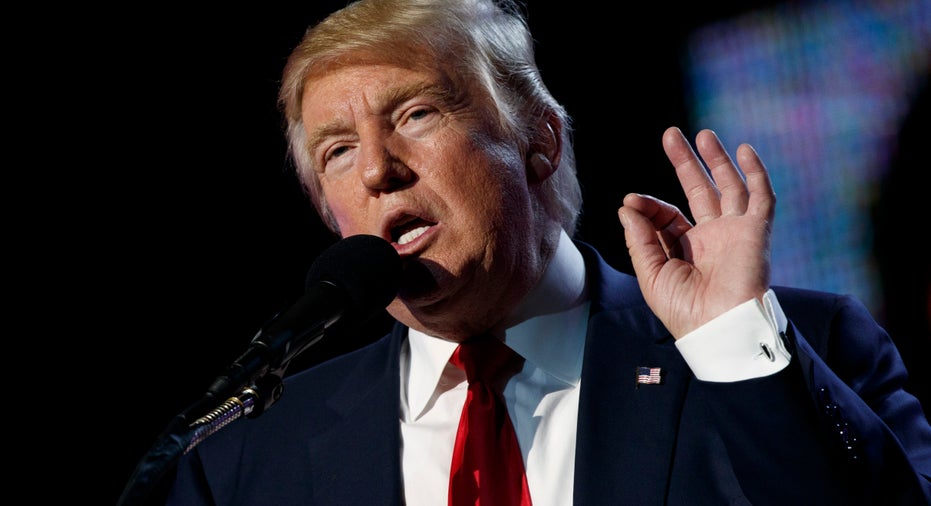Here's How Trump's Tax Cuts Could Affect U.S., Global Economic Growth

Donald Trump's vowed tax cuts could goose global economic growth this year and next, the World Bank said Tuesday, fresh fuel for a world struggling with stagnant trade, weak investment and rising policy uncertainty.
In its semiannual flagship economic report, the development institution said the global economy should expand by 2.7% this year, down a bit from the 2.8% predicted last June. But it is up from last year's postcrisis low of 2.3%. The U.S. economy is picking up steam and stabilizing commodity prices are helping major emerging-market economies rebound, it said.
The bank estimates the U.S. president-elect's proposals to slash corporate and personal income taxes could add up to 0.3 percentage point to American growth this year and up to 0.8 percentage point next year. That could raise the U.S. growth rate to 2.5% this year and 2.9% next, and add 0.3 percentage point to global growth next year, the bank said.
"All eyes are on the likely changes in policy direction in the U.S.," said Ayhan Kose, the chief author of the report.
While those numbers are far from Mr. Trump's pledge to raise growth to 3.5%, they are still a vote of confidence for at least one plank of the incoming president's economic platform. The bank said the upside projections aren't part of its core forecasts, however, because of the uncertainty surrounding the next administration's policies.
And the institution warned Mr. Trump could offset potential gains from his promised tax cuts if he triggers a trade war with rivals such as China and Mexico. Officials at the bank and its sister institution, the International Monetary Fund, fear the Trump administration could stir global protectionism by delivering on threats to slap China and Mexico with tough new tariffs. They caution such trade restrictions could curb already weak global growth. That, some officials warn, raises odds for geopolitical conflict, pointing back to the protectionist origins of the Great Depression and World War II.
Political and policy uncertainty in the U.S., Europe, China and in other major economies around the world is at unprecedented levels, the bank said. That is a major factor behind corporations around the world focusing more on acquisitions than pouring capital into new projects.
Nearly a decade after the financial crisis rocked world markets, the global economy has struggled to recover. Europe and Japan have labored to escape from high debt and weak inflation. Emerging markets have strained at the limits of growth without fundamentally restructuring their economies.
When China's expansion decelerated at a faster pace than expected, it triggered a two-year commodity price rout that hit many developing economies doubly hard as both export demand and prices fell.
Combined, all of those factors help global trade stagnate. Growth in the volume of cross-border sales of goods averaged 0.9% through September 2016, well shy of its long-term trend of 6.5%.
The fallout from the commodity-price plummet and China's slowdown has yet to fully feed through economies such as Nigeria, Venezuela and Saudi Arabia that rely heavily on exports of oil, ore, grains and other commodities. Many were forced to slash their budgets and debt has surged. But now that commodity prices have recovered some of their two-year losses, many economies are beginning to stabilize. Brazil and Russia, for example, are expected to expand again following two years of severe recession.
Investors are still skittish, however, about re-entering emerging-market economies, especially given political risks such as Turkey's attempted coup last year and Brazil's ongoing corruption scandal.
Europe shows signs of finally recovering, but output is still hampered by ongoing weakness in the banking sector, particularly Italy's. And the U.K.'s exit from the European Union, combined with a swell in anti-euro populism ahead of key elections across the region, is feeding investor uncertainty and suppressing investment.
In a global economy facing stagnating trade, low productivity growth and feeble investment, some risks stand out.
Many economists worry China's economy, the world's second largest growth engine, may stall. Goaded on by Beijing's cheap-credit policies, debt has reached levels that in other countries were followed by financial crises.
An unexpected surge in U.S. inflation could force the Fed to raise rates much faster than currently planned. Higher borrowing costs would then hit emerging-market firms and governments with large debt loads, particularly commodity exporters.



















